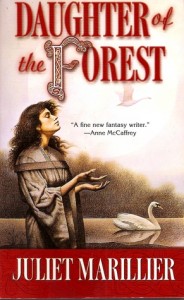 Daughter of the Forest by Juliet Marillier (Sevenwaters #1)
Daughter of the Forest by Juliet Marillier (Sevenwaters #1)
Genre: Fantasy, Romance
Publisher: Tor on April 1, 1999
Source: Purchased
Lovely Sorcha is the seventh child and only daughter of Lord Colum of Sevenwaters. View Spoiler »
Trigger warning: this novel and review deals with sexual assault.
Sorcha was supposed to have been born a boy. By all rights she should have been the seventh son of a seventh son, but fate had other plans. With six older brothers to play with her, teach her, and protect her, Sorcha grows up to be both strong-willed and knowledgeable in many arts typically forbidden to women of her rank. While she is close to all of her brothers, she is particularly connected to Finbar, who shares her mysterious gifts. The two siblings can communicate without speech or touch, and Finbar seems to have some degree of prescience. But he doesn’t foresee their family’s downfall until it is much too late.
For when her father is seduced by the evil enchantress Oonagh, the peace and quiet magic of life at Sevenwaters is destroyed. Oonagh uses her dark magic against the siblings and Sorcha escapes only with the aid of the forest – and the Fae. Sorcha learns that her brothers have been transformed into swans, and the only way to free them is if she completes a truly Herculean task. The Fae tell her that to be reunited with her beloved brothers, Sorcha must bear unimaginable pain and suffering in complete silence. For if she speaks before the task is complete, her brothers will live as swans forever…
Daughter of the Forest has the kind of magic system where very little is explained in terms of abilities or spells, largely because magic itself is considered mysterious and at least partially beyond the scope of human understanding. Sorcha knows that she must listen to the Fae if she is to succeed, and trusts that the Lady of the Forest will do what she can to help her. But the Lady of the Forest also knows that to break the curse Sorcha must prove herself worthy, undergoing a trial of fire that few could survive.
It’s difficult to remember that Sorcha is only a young teen as these events unfold because she’s subjected to the worst horrors imaginable. There is one scene where Sorcha is raped that was simultaneously so awful and so well written that I literally felt sick to my stomach. Normally I can’t read books that include sexual assault, but Juliet Marillier writes about it sensitively and with remarkable compassion. She doesn’t shy away from portraying the shame and fear that Sorcha feels in the wake of this attack, and she doesn’t sweep it under the rug when Sorcha begins to fall in love. Sorcha’s feelings about men and sexual desire are understandably complex and conflicted, and they added a compelling realism and grit to what may have otherwise been an entirely otherworldly tale.
Sorcha’s strength is not only in her ability to persevere through tragedy, but in her desire to heal others regardless of their political, religious, or national affiliations. Since Daughter of the Forest is set during the Medieval period, there’s a lot of strife between the Britons and the Celts, and between the old ways and Christianity. A healer with a compassionate heart, Sorcha is loath to use her knowledge of herb lore and medicine against anyone…even those who she’s been raised to call her enemies. And for anyone who’s curious, a quick internet search showed that all the herbs Sorcha uses in her healing are actually known medicinal ingredients.
In her desire to help her brothers and heal those around her, Sorcha learns much about the conflict between her people and the Britons. And as she comes to know and care for them, she realizes that the two peoples are not as different as she once thought. One relationship in particular shows Sorcha that cultural barriers can be transcended, and it’s honestly one of the most beautiful love stories I’ve ever read. I won’t spoil the pairing for anyone, but suffice it to say that Marillier writes a truly epic love story that completely swept me away.
While the romance plot does become a significant part of the story (I consider Daughter of the Forest a fantasy-romance), it never completely overtakes Sorcha’s quest. Sorcha fights for love and for family, proving that it’s not skill in battle or political strategy that makes someone a hero: it’s willingness to sacrifice themselves to see justice done and to help others.
Recommended for anyone who loves dark fairy tales, appreciates beautiful writing, and can handle mature themes.